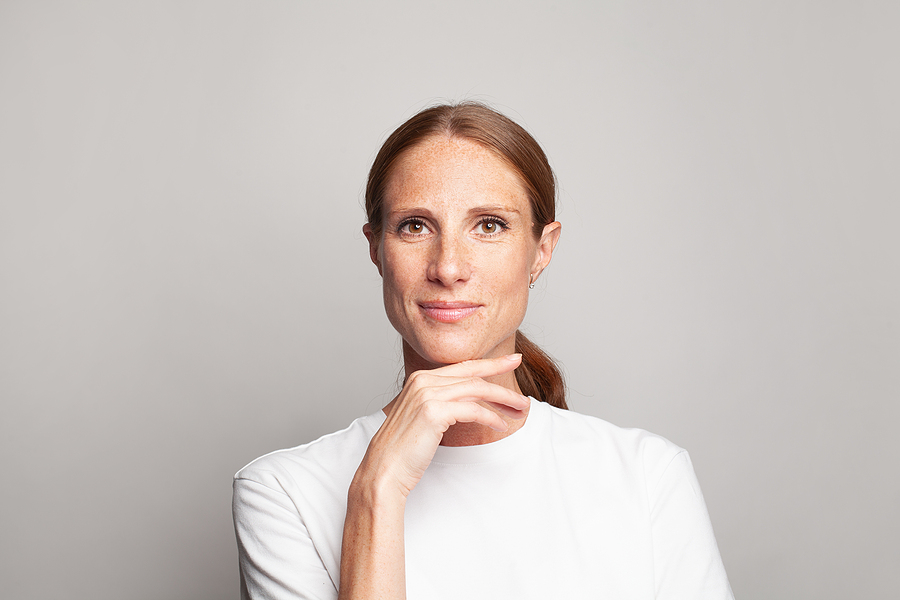About a month ago, a friend of mine called me, completely confused because all of a sudden, she couldn’t fit into her favorite pants. She told me that she had looked in the mirror, and noticed this new fat around her belly and waistline that seemed to have appeared overnight.
It wasn’t just the belly fat: she was also feeling exhausted, and has been running herself ragged with work, her home life, and taking care of her aging parents. The brand new belly fat was like the cherry on top.
I can’t tell you how many times I’ve heard stories like this in my practice. And if it sounds anything like what you’re going through, you’re not alone!
In our 40s, 50s, and beyond, we are going through a very interesting time of change. Many changes are positive, and others are a bit harder to understand. The truth is, it is common for women to gain weight or have more difficulty losing weight after 40 and during menopause– it’s definitely not in your head. But it’s also not inevitable or irreversible!
I know that it can be frustrating, especially when you haven’t made any noticeable changes to your diet or exercise routine, and this new belly fat seems to have appeared overnight for no reason at all. The truth is that after 40, your body simply might not respond to food, exercise, or stress in the same way that it used to. My suggestion is that you first accept that your body is changing and preparing you for the next stage, that you endeavor to make a few gentle, healthy changes in order to help your body adapt gracefully, and get to know the new you in the process.
Part of the problem is that when we don’t fully understand the changes that are happening with our bodies and hormones as we enter our 40s, it can be easy to get caught in a spiral of unsuccessful fad diets, over-exercising, and feelings of low self-worth. I’m here to tell you that you CAN lose weight and prevent unwelcome weight gain after 40, the healthy and sustainable way. All it takes is a little understanding of your body’s inner workings, and a lot of self-love.
The reasons for weight gain after 40 are layered… natural, hormonal changes, combined with genetics and lifestyle changes, are all working together.
First things first: shake off the notion that you’re doing something wrong! The routine that worked for you in your 20s and 30s, that kept you feeling healthy and lean, just might not be the right fit for your body anymore. This doesn’t mean that you have to become more extreme in your diet and exercise choices– it just means that you have to get a little bit strategic, and outsmart your changing hormones and metabolism.
And believe me, I know… with everything going on in your life in your 40s and beyond, it can be hard to find the time and energy to even think about this. But if we focus on losing weight sustainably (be wary of any promise to drop pounds fast), we can make gradual changes that impact our overall well being.
Beyond the way we feel about our weight, taking care of excess fat, especially around the belly, can help to reduce the risk of developing chronic illnesses including heart disease, diabetes, and certain kinds of cancer.
So, why are we more prone to weight gain and stubborn excess fat after 40? There are a number of reasons. Let’s walk through some of the biggest culprits one by one, and then I’ll guide you through a number of strategies for overcoming each of them, so that you be and feel like your best self.
Your Hormones are Changing
Hormones are one of the biggest culprits behind the changes to our bodies after 40. In addition to excess weight, changing hormones can lead to decreased bone density, lower sex drive, and lower mood.
During perimenopause, it is normal for your hormones to change. Levels of sex hormones estrogen and progesterone start to go down, other hormones like testosterone and cortisol fluctuate, and this influences much more than your reproductive system.
Changing estrogen levels influence weight, metabolism, and fat storage.
We also have hormones that are responsible for letting us know when we are hungry, and when we are full. But when we are in our perimenopausal state of fluctuation, these can become confused as well. This can cause us to eat past the time when we should be feeling satiated.
Sleep Issues
When our levels of estrogen, progesterone, and other hormones shift, it can impact the quality of our sleep. Many women I talk to in their 40s and 50s are struggling with restless sleep, insomnia, or just waking up feeling unrefreshed. This might not seem like it has anything to do with your changing hormones, or with your weight, but it does. Disrupted or insufficient sleep has been directly linked to weight gain. And, if you’re waking up feeling tired and groggy, you’re more likely to reach for sugary foods or carbohydrates for energy– and less likely to want to go out and exercise.
Changing Metabolism
Our metabolism gradually slows down as we get older, which influences how much energy we expend during exercise and how we turn food into energy. Changing estrogen levels also play a role in the slowing of your metabolism.
Fat Storage
Age-related weight change is often not as much about the actual weight as it is about the way it’s distributed. Stress and changing cortisol levels lead to increased fat around the belly and waistline, and lower estrogen levels can do the same.
Muscle Loss
One of the biggest reasons why so many women struggle with their weight after 40 is that we start to lose more and more muscle every year. This influences metabolism, fat storage, and weight gain.
Insulin Resistance
It is normal to produce a bit less insulin (the hormone that regulates blood sugar levels) after 40. But as we get older, especially if we are putting on a bit of weight, our bodies can also start to become resistant to the insulin we are producing. Insulin resistance and higher or heavily fluctuating blood sugar levels can lead to more cravings, more weight gain, and a greater risk of type 2 diabetes.
Stress
You probably know that I talk all the time about what stress does to the body, and when it comes to weight gain, it plays a huge role! Adrenal fatigue and fluctuating levels of the stress hormone cortisol are linked to problems with blood sugar regulation, increased fat around the belly, and difficulty losing weight.
Life Gets In the Way
In addition to all of the changes going on in our bodies during this stage of life, the fact of the matter is that many of us are spreading ourselves way too thin as it is to even be able to think about developing a consistent exercise plan. If you are balancing a superhuman combination of work, kids and family life, caring for aging relatives, trying to see your friends, and taking care of the house, where are you supposed to find the time to take care of yourself?
I understand this feeling, but I also know that it is essential to make that time for you! And it’s not all about your weight– far from it. I like to think of weight loss as just one element, or even a fringe benefit, of achieving a healthier, happier, more vibrant you.
The Importance of Healthy Weight Loss
I talk a lot about accepting and loving your changing body as you get older. But that doesn’t mean you have to sit idly by if you’re not feeling comfortable in your own skin! I believe that we can be accepting and forgiving of ourselves, but still be proactive and make positive, mindful, sustainable changes.
When it comes to weight loss, some of it might be about how we feel when we look in the mirror, but the truth is that achieving a healthy weight benefits us in so many other ways, and healthy weight loss generally accompanies an overall improvement in wellbeing. Don’t be surprised if you notice an improved mood, more energy, and clearer skin along with a trimmer waistline!
How to Lose Weight After 40
If your regular diet and exercise plan has stopped working for you, don’t give up! It is natural for your body to change after you hit 40, but it is definitely possible to lose your excess weight, keep it off, and feel fantastic. Here are some of the best strategies for losing weight naturally and sustainably in your 40s, 50s, and beyond.
Diet
Taking a close look at your diet is a great place to start when it comes to formulating a healthy weight loss plan after 40. You might already feel that you’re eating a fairly healthy diet, but with all of the changes that your body is going through, including fluctuating hormones and a changing metabolism, there might be a few helpful adjustments for you to make.
A healthy diet for weight loss and overall well being should be balanced, and should include lean protein sources, healthy fats, lots of vegetables, and carbohydrates in moderation. Try to cut back on inflammatory foods like gluten, dairy, and fried foods, and avoid refined sugar and processed foods. Avoid soda, including the diet kind, whose artificial sweeteners and preservatives can further confuse your hormonal balance and health.
Healthy fats (including avocados, olive oil, fatty fish, and coconut oil) are great for brain health, heart health, and reducing the risk of disease. They also tend to keep you full for longer, which will reduce your likelihood of cravings or overeating.
Healthy proteins, like grass-fed beef, organic chicken, and wild-caught fish, are great for building muscle and helping to balance out your hormones, and can assist in healthy weight loss.
Of course, load up on fresh vegetables, especially leafy greens, to fill you up with vitamins, minerals, and all of the other good things! Vegetable intake can also help to prevent sugar cravings.
Healthy portions of complex carbohydrates (starchy vegetables, whole grains, fruit) are good, but try to stay away from refined carbohydrates and processed foods as much as possible.
It’s also a good idea to limit alcohol intake when trying to lose weight. I’m not going to tell you that you can’t have the occasional glass of wine with dinner, but alcohol is a sneaky source of both calories and sugar. It also tends to lead to disrupted sleep, and can increase the likelihood of hot flashes.
Aerobic Exercise
Okay, here we go: staying active really is essential if you want to trim excess fat and feel your best after 40. Aerobic exercise is one of the best ways to boost your metabolism, and it also helps to reduce the risk of chronic illnesses like diabetes and heart disease– plus, you are likely to notice an improved mood and increased energy levels.
The great news is there are all kinds of great ways to work extra aerobic exercise into your day-to-day without having to spend more time at the gym. Taking a brisk walk at lunch or after dinner is a perfect way to get moving. Activities like biking, yoga, and swimming are favorites for many of my patients. Even dancing around the house while you’re cleaning counts! I find that just keeping the idea of staying active on your mind throughout the day means that you’ll find opportunities wherever you look.
As you start to increase the amount of aerobic exercise you’re doing, remember to know your limits. Too much intensity is not going to help, and will only increase your risk of injury. Work your way up gradually, and listen to your body. If possible, work with a personal trainer to come up with a plan that is right for you.
Muscle Building
One of the healthiest and most effective ways to lose weight after 40 is to introduce muscle building and strength training activities into your workout routine. We lose muscle as we age, and this is one of the biggest culprits when it comes to age-related weight gain. Building up muscle can help to speed up your metabolism, help with calorie burning, keep your bones healthy, and help you to feel vibrant and strong overall.
Light weightlifting (again, work your way up gradually), pilates, and resistance training are all great ways to prevent muscle loss and burn calories.
Improve Sleep
Good sleep habits are essential for weight loss and overall health. The hormonal changes we go through during perimenopause can make uninterrupted sleep difficult, between hot flashes, night sweats, early awakenings, and everything we have on our minds.
But, as always, there are a few things you can do to outsmart your hormones here! Avoiding sugar and caffeine in the afternoon and evening is always helpful. It’s also best to avoid alcohol, which can lead to shallow sleep and an increased risk of hot flashes. Limit the use of electronics before bed, as the blue light they give off can interfere with melatonin, the hormone that helps you fall asleep. Finally, make sure that you have light, breathable PJs to sleep in. These can make all the difference!
Manage Stress
Chronic stress is one of the most common things I see in my practice. Almost all of the women I work with have some degree of adrenal fatigue, which means that their bodies are overburdened from stress. This is a huge contributor to weight gain, especially belly fat. Managing and reducing stress is absolutely essential for weight loss and in order to feel better all around. Make time for meditation, yoga, writing in a journal, soaking in a hot bath, whatever makes you feel good. Remember to say “no” when you are overstretched. Consider it a prescription! This piece is just as important as anything else you do– often more.
It is also helpful to stay mindful about weight loss and your self-image. You don’t want to obsess over what you’re eating or what the scale says. Just pay attention, and be gentle with yourself. Check in with yourself when you have a craving, and ask yourself if this is really about the food, or something else.
If you feel that you have made all of the necessary changes and are still struggling to lose weight, consider calling the clinic here and finding out about my weight loss program, with most of my patients losing 20 lbs in the 6 weeks of the program.
Continue to be kind to yourself throughout this journey. Remember that losing excess weight is for your overall health and wellbeing, and not about the way you look. Be prepared to shed the extra pounds, have more energy, and feel fantastic– this can be an absolutely beautiful time in our lives if we let it!







